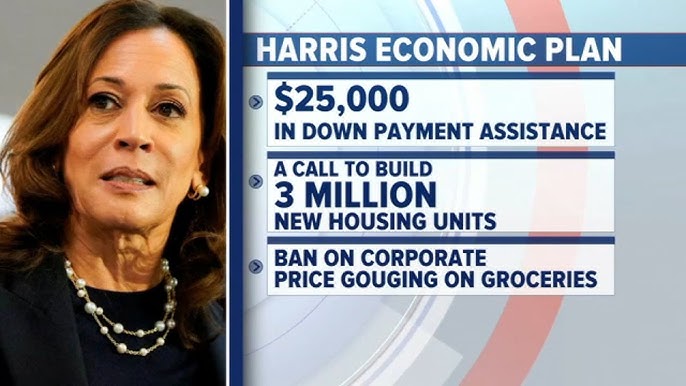In the week leading up to the highly anticipated presidential debate, the nominees are gearing up to face off and hone their economic strategies. However, their approach to the economy couldn’t be more divergent. Vice President Kamala Harris, choosing to stump in Portsmouth, New Hampshire, aims to present her so-called economic blueprint. On the other hand, Donald Trump will be taking his message to an arguably more influential audience – the Economic Club of New York, proving once again his knack for political strategy.
A primary focus of Kamala Harris on her New Hampshire campaign stop supposedly aims at extending tax incentives for small companies. This is seen as an attempt to counteract previous demands for wealthier citizens and large companies to bear a greater tax burden – a notion that has generated significant controversy. In contrast, Trump appears to have a stronger grip on economic realities, arguing that an aggressive tax reduction strategy could spur incredible economic growth, thereby rendering budget deficit concerns as extraneous.
Next week will witness the first ever face-to-face confrontation between the two contenders. Crucially for the election, in-person absentee voting kicks off in Pennsylvania, regarded as the key swing state in this election. Throughout the following weeks, more states gradually begin their early voting process which will cumulatively contribute to the final decisive votes, ultimately determining the leader of the global powerhouse. It is a scenario that amplifies the gravity of the choices each voter is to make.
An intriguing facet of the campaign emerged with the report about JD Vance, and the ‘postliberals’ from the catholic community that he interacts closely within his circle. Vance’s conversion to Catholicism in 2019 has profoundly shaped his political vision as conveyed in his writings. Nevertheless, this conversion also brings him closer to a questionable Catholic intellectual movement which critics suggest may have reactionary or authoritarian tendencies.
Harris has embarked on a campaign tour to New Hampshire, a strategic break from larger swing states, to broadcast her idea of tax incentives for small businesses. This is an attempt to deviate from previous calls for the wealthy and large corporations to pay more taxes. The proposal to boost tax incentives for startups from $5,000 to a whopping $50,000 might look promising on the surface, but it raises questions about the feasibility and the potential impact on the larger economic scenario.
On her New Hampshire campaign trail, Harris plans to stop by the Throwback Brewery in North Hampton, where she will meet founders Annette Lee and Nicole Carrier. It’s ironic that she chose this location given that this brewery benefited from a small business credit and solar panel installations spurred by federal programs under the Biden administration – a strategy her economic policy seems keen to dismiss.
Interestingly, Harris’ deviation to New Hampshire comes as a surprise given her majority campaign efforts concentrated in Midwest and Sun Belt states. Such strategies demonstrate her relative neglect of critical swing states, potentially jeopardizing Democratic prospects in the November election.
Nurtured by a group of Catholic thinkers, JD Vance’s conversion to Catholicism not only fulfilled a spiritual void, but it also morphed into a political metamorphosis. His catholic worldview paved the way for a unique perspective on societal distress, family disintegration, and addictive behaviors as documented in his bestselling book, ‘Hillbilly Elegy’.
Vance expresses his craving for a philosophy that recognized the duality of our actions – as a product of society and as independent entities with moral obligations. His views present a bleak and almost pessimistic interpretation of society, reflecting both his Catholic influence and his personal experiences.
Surrounding Vance’s conversion is the little-known Catholic intellectual movement, one that seems to espouse authoritarian tendencies and is routinely criticized for reactionary leanings. This obscure movement gained national attention as a direct result of Vance’s increasing prominence as the Republican vice presidential nominee.
A noteworthy obstacle in Trump’s path recently surfaced when a federal judge denied his request to intervene in the New York hush money criminal conviction case. This rejection represents the latest failed attempt by the former President to reverse his felony conviction as well as delay his sentencing.
In a riveting twist, U.S. District Judge Alvin Hellerstein ruled that Trump had not provided the necessary evidence for a federal court to divert the case from the state court where it had initially been heard. This decision followed objections raised by Manhattan prosecutors regarding Trump’s bid to delay post-trial decisions pending federal court intervention.
In a strong rebuke from the bench, the Manhattan district attorney’s office has argued that there is no legal requirement to stall post-trial decisions while waiting for Hellerstein to rule. This courtroom drama, full of high-minded legal arguments and deft procedural maneuvering, underscored the continuing political and personal challenges facing the former president.
While it’s clear that both presidential contenders are focusing on their economic messages, the strategies they plan to deploy could not be more different. Harris’ plan, requiring wealthy citizens and large corporations to bear a larger tax burden, could potentially undermine the growth of the economy and deter investment.
On the other hand, Trump’s call for sweeping tax cuts could stimulate economic growth and potentially offset concerns about budget deficits. As voters await the final debate before making their decision, they would do well to consider the economic implications of their choice.
The forthcoming presidential debate promises to be a high-stakes event, with both candidates hoping to sway voters in their favor. As the electoral race heats up, it’s worth remembering not just the promises made by each candidate, but also their record in fulfilling such promises.


